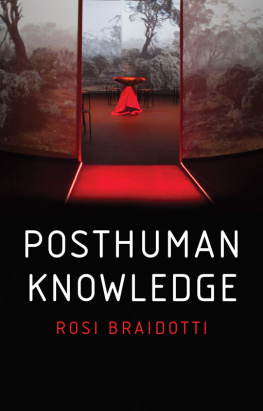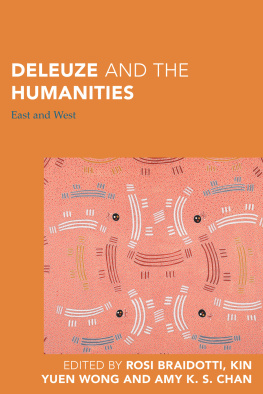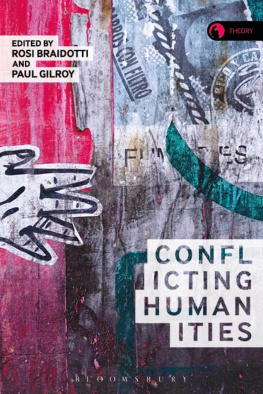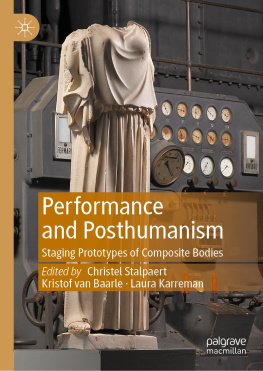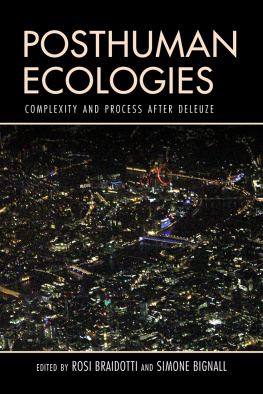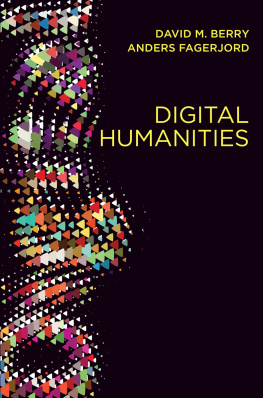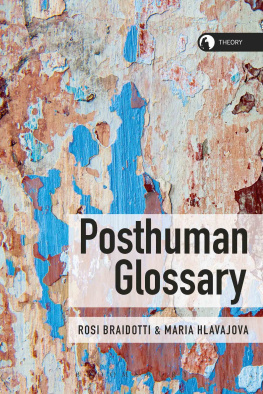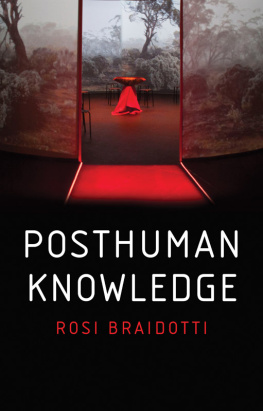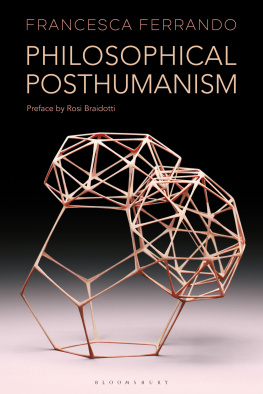
Posthuman Knowledge
Rosi Braidotti
polity
Copyright page
Copyright Rosi Braidotti 2019
The right of Rosi Braidotti to be identified as Author of this Work has been asserted in accordance with the UK Copyright, Designs and Patents Act 1988.
First published in 2019 by Polity Press
Polity Press
65 Bridge Street
Cambridge CB2 1UR, UK
Polity Press
101 Station Landing
Suite 300
Medford, MA 02155, USA
All rights reserved. Except for the quotation of short passages for the purpose of criticism and review, no part of this publication may be reproduced, stored in a retrieval system or transmitted, in any form or by any means, electronic, mechanical, photocopying, recording or otherwise, without the prior permission of the publisher.
ISBN-13: 978-1-5095-3525-5
ISBN-13: 978-1-5095-3526-2 (pb)
A catalogue record for this book is available from the British Library.
Library of Congress Cataloging-in-Publication Data
Names: Braidotti, Rosi, author.
Title: Posthuman knowledge / Rosi Braidotti.
Description: Medford, MA : Polity, 2019. | Includes bibliographical references and index.
Identifiers: LCCN 2018059982 (print) | LCCN 2019014453 (ebook) | ISBN 9781509535279 (Epub) | ISBN 9781509535255 (hardback) | ISBN 9781509535262 (pbk.)
Subjects: LCSH: Humanism.
Classification: LCC B821 (ebook) | LCC B821 .B628 2019 (print) | DDC 144--dc23
LC record available at https://lccn.loc.gov/2018059982
Typeset in 10.5 on 12pt Sabon
by Fakenham Prepress Solutions, Fakenham, Norfolk NR21 8NL
Printed and bound in Great Britain by TJ International Ltd
The publisher has used its best endeavours to ensure that the URLs for external websites referred to in this book are correct and active at the time of going to press. However, the publisher has no responsibility for the websites and can make no guarantee that a site will remain live or that the content is or will remain appropriate.
Every effort has been made to trace all copyright holders, but if any have been overlooked the publisher will be pleased to include any necessary credits in any subsequent reprint or edition.
For further information on Polity, visit our website: politybooks.com
Acknowledgements
During the research phase of this book I benefited greatly from the stimulating intellectual environment at the Institute of Advanced Studies at University College London that Tamar Garb and her team set up and where I was Distinguished Visiting Professor in 2017. I am also grateful to Henrietta Moore, Director of the Institute for Global Prosperity at University College London, who invited me as an active Honorary Visiting Professor as of 2017.
I spent two very productive months as a Senior Visiting Fellow at the Internationales Kolleg fr Kulturtechnikforschung und Medienphilosophie (IKKM), at the Bauhaus University Weimar in Germany. I am grateful to Lorenz Engell and Bernhard Siegert for their research leadership, and to my research assistant Eduard Kolosoff for his devoted support.
Part of this material was first presented in my Tanner Lectures in Human Values at Yale University in 2017. I want to thank the Tanner Foundation in Utah and the Tanner Lectures Committee at Yale University for their invitation, and especially Yale University President Peter Salovey for his warm and witty welcome. Sincere thanks to Professor Gary Tomlinson and his colleagues and staff at the Whitney Centre for the Humanities for their splendid hospitality. I am grateful to my respondents Joanna Radin and Rdiger Campe for their insightful contributions during the open discussion, and to many colleagues and students for their formal and informal comments during the sessions. I am also grateful to my friend Moira Fradinger for her moving public introduction.
My sincere thanks to Genevieve Lloyd for her wise and enlightening guidance throughout the drafting process of this book. Thanks also to Matthew Fuller and Keith Ansell-Pearson for their generous insights, theoretical advice and bibliographical details. I am much indebted to Marlise Mensink for her warm friendship. I also wish to thank my personal research assistants Gry Ulstein, Evelien Geerts and Lauren Hoogen Stoevenbeld for their unfailing logistical and organizational assistance. I am indebted to Linda Dement for introducing me to Jessie Boylans photograph of the 2015 Ngurini, an immersive installation by the Nuclear Futures Arts Program with the Yalata Aboriginal Community.
Sections of this book were published in my chapter in the volume Conflicting Humanities, which I co-edited with Paul Gilroy in 2016, and in the Introduction to The Posthuman Glossary, which I co-edited with Maria Hlavajova in 2018. I acknowledge them both warmly here. An earlier draft of the theoretical framework for the PostHumanities was published in Theory, Culture & Society in May 2018.
This book would not have been possible without the loyal support of my publisher John Thompson; I truly thank him for his enduring commitment to my posthuman project.
Finally, my eternal gratitude to my life partner Anneke Smelik for her intellectual, emotional and moral support, and because living together is so much fun.
Acknowledgement of the Cover Image
Ngurini, immersive installation by the Nuclear Futures Arts Program with the Yalata Aboriginal Community, 2015. Photo by Jessie Boylan.
Introduction: Posthuman, All-Too-Human
It is not at all uncommon for users of any kind of websites or digital services to be requested to prove their humanity on a daily basis. The prompt usually reads something like: Before We Subscribe You, We Need To Confirm You Are A Human. And it looks like this:

Having to demonstrate ones humanity assumes as the central point of reference the algorithmic culture of computational networks not the human. This mundane example demonstrates that in contemporary society the human has become a question mark. Who or what counts as human today?
This is not a simple question and it is best answered in the context of our posthuman times. What or who is the human today can only be understood by incorporating the post-human and non-human dimensions. By posthuman I mean both a historical marker of our condition and a theoretical figuration. The posthuman is not so much a dystopian vision of the future, but a defining trait of our historical context. I have defined the posthuman condition as the convergence of posthumanism on the one hand and post-anthropocentrism on the other, within an economy of advanced capitalism (Braidotti 2013, 2017). The former focuses on the critique of the Humanist ideal of Man as the allegedly universal measure of all things, while the latter criticizes species hierarchy and anthropocentric exceptionalism. Although they overlap and tend to be used interchangeably in general debates, they are rather discrete and separate events, both in the intellectual genealogies and in their social manifestations.
As a theoretical figuration, the posthuman is a navigational tool that enables us to survey the material and the discursive manifestations of the mutations that are engendered by advanced technological developments (am I a robot?), climate change (will I survive?), and capitalism (can I afford this?). The posthuman is a work in progress. It is a working hypothesis about the kind of subjects we are becoming. Who that we is, and how to keep that collectivity open, multiple and non-hierarchical, will be constant concerns in this book.
Next page
